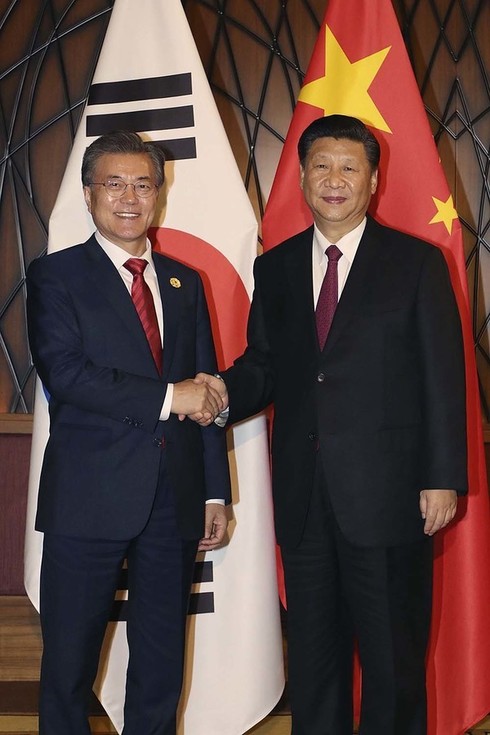 |
|
South Korean President Moon Jae-in shakes hands with Chinese President Xi Jinping prior to the two leaders’ summit on the sidelines at the APEC meeting held in Da Nang, Vietnam on Nov. 11. (provided by Blue House)
|
North Korean nuclear and missile programs will be topics of discussion
South Korean President Moon Jae-in is planning to hold a third summit with Chinese President Xi Jinping during Moon’s state visit to China from Dec. 13 to 16, prompting speculation about whether they will reach a breakthrough on the North Korean nuclear and missile issue. Moon and Xi’s summit is of particular interest because it is being held just two weeks after North Korea launched its Hwasong-15 intercontinental ballistic missile (ICBM) on Nov. 29. Another question is whether the THAAD issue – which Seoul claims has been placed under a “seal” – will return to the agenda at the summit. “[The two leaders] will discuss various matters of mutual interest, including regional and international issues and plans for cooperating on peacefully resolving the North Korean nuclear issue and for establishing peace on the Korean Peninsula,” said Blue House spokesperson Park Soo-hyun in a briefing on Dec. 6. President Moon is likely to emphasize the need for China to implement the UN Security Council sanctions against North Korea while also discussing diplomatic solutions that would bring North Korea to the negotiating table. During a telephone call with Japanese Prime Minister Shinzo Abe on the day of the Hwasong-15 launch, Moon said that he would ask Xi to play an even stronger role during his trip to China. For his part, Xi has maintained that China is faithfully implementing the UN Security Council resolutions. Xi might once again call for the simultaneous pursuit of denuclearization and peace talks with North Korea, which an approach that China has long espoused. Xi is likely to respond to any other requests by asserting that China’s influence is limited and by emphasizing that North Korea and the US must find a solution. Song Tao, head of the International Liaison Department for the Chinese Communist Party (CCP), visited North Korea last month as a special envoy for Xi, but Song was not given an audience with North Korean leader Kim Jong-un. In addition to pressure and sanctions, the two leaders are also likely to address the possibility of North Korea taking part in dialogue. A Blue House official said that Moon would thoroughly ascertain the intentions and current status of North Korea’s declaration of the completion of its state nuclear force following UN Undersecretary-General Jeffrey Feltman’s visit to North Korea and use this as the basis for discussing a solution to the North Korean nuclear issue with Xi. The Blue House is cautiously interpreting the fact that North Korea made this declaration immediately after launching the Hwasong-15 as a signal that North Korea is shifting its focus toward dialogue. Another big question is whether the THAAD issue will be brought up again during Moon and Xi’s summit. Even after talks on Oct. 31 during which South Korea and China agreed to improve their relations by placing a “seal” on the THAAD issue, Premier Li Keqiang, Foreign Minister Wang Yi and Xi himself have repeatedly mentioned the THAAD issue. During his trip to Southeast Asia on Nov. 14, Moon said he hoped that the THAAD issue would not be on the agenda of his summit with Xi next month. “We would like the spirit of the Oct. 31 agreement to be kept. We hope that President Xi will either not mention the issue at all or will tone down his remarks relative to the summit in Vietnam,” a senior Blue House official said. “In domestic politics, China has continued to call for the THAAD removal, but now it has basically agreed to tolerate THAAD. Since many questions have been raised about President Xi’s leadership, he has no choice but to continue sending a message to the public” expressing a hardline stance on THAAD, said Yang Gap-yong, a professor at the Sungkyun Institute of China Studies. In terms of the economy, Moon is expected to once again underline the two governments’ agreement to normalize cooperation and exchange in all areas, which would represent a request for China to ease the restrictions it has placed on South Korean companies and on the tourism and cultural sectors. China is likely to call for South Korean companies to participate in the “One Belt, One Road” project, which is one of Xi’s key policy initiatives. Furthermore, Moon will reportedly ask for China’s cooperation with peacefully hosting the Pyeongchang Winter Olympics, which are just two months away, and will suggest once again that Xi visit South Korea. By Seong Yeon-cheol and Kim Ji-eun, staff reporters Please direct questions or comments to [english@hani.co.kr]






